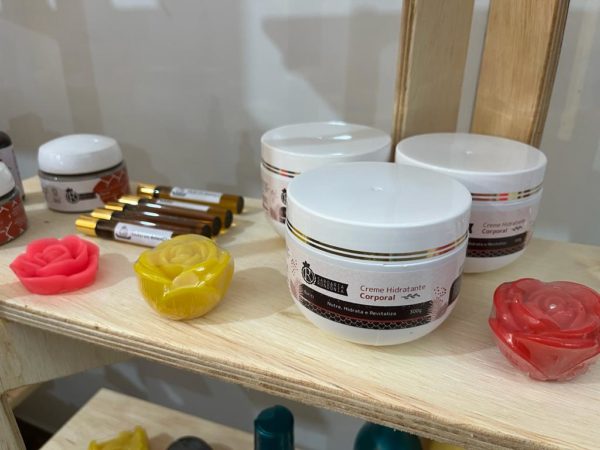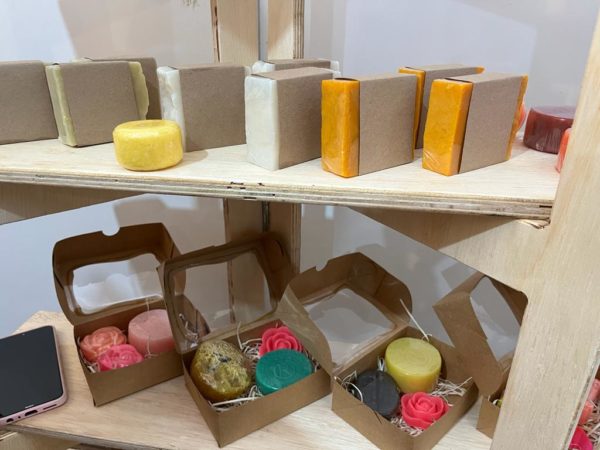São Paulo – A buriti palm oil in the backyard, BRL 152 on her bank account and a dream. That’s how the story of the Saboaria Rondônia started. Its founders Mareilde Freire and her daughter Jaqueline Freire wanted to make a moisturizer that helped hydrate their dry skin but wouldn’t get sticky under the heat of Rondônia. Pictured above, Mareilde (R) and Jaqueline (L).
After a few attempts, she arrived at the recipe of the buriti body moisturizer. She knew the properties of the buriti oil were great for various types of cosmetics, so she started making soaps, at first with glycerin, and now she has natural soaps free from synthetic ingredients, face and body scrubs, moisturizing mists, hair products, lip balm, and others.
The flagship of the company is the burity oil that’s extracted by approximately twenty women from rural communities in Rondônia – in Ouro Preto do Oeste, Cacoal, and Machadinho d’Oeste – and also Acre.

“Our firm has three pillars: rural women’s empowerment, sustainable development, and the promotion of the regional supply chain. And on these pillars, we create connections and support each other,” Mareilde told ANBA during the 10th Rondônia Rural Show Internacional in Ji-Paraná.
Besides taking women into the oil extraction market, the soap manufacturer also holds training sessions and workshops, as well as leisure activities. “We held a milk workshop, since we’re in a milk producing region, distributing dairy products, and we held spa days for them in order to raise awareness on the range of possibilities we have,” said Jaqueline.
Mareilde stresses she wants to sell more to be able to expand the business. “For us to thrive and expand not only as a manufacturer but as a whole chain, to engage more women, more family farming, empower the small producers. We see an abundant natural wealth, but we don’t have much technology, so each person has to play their role,” she said.
The original idea came back in 2015, when the BRL 152 were used to buy the first ingredients for the glycerin soaps, and then after noticing the moisturizing power combined with what they had in her backyard, they started the soap business.
“Then we had to create criteria. We’re bringing this development by sustainably harvesting the burity, the babaçu, so we can’t exhaust what nature provides us. This balance is what makes the soap manufacturer what it’s today,” said Mareilde.
“Now a standing buriti palm means income, food, and conservated forest, as when we extract the oil, we use it in cosmetics, while the seed becomes a seedling and goes back to the environment. We now have a reforestation area. We are discovering the bottlenecks, as the whole supply chain has to adapt and be structured,” said Jaqueline.

A buriti palm takes 7 to 15 years to start bearing fruit. The reforested trees are starting to bear fruit. “In a few days we’ll harvest from our own plantations for the first time,” the daughter said.
For now, the sustainably managed harvesting is made by rural women. “Last year, in 2022, we did a mapping and identified each buriti palm in our own property and the partners’, so now if you want to adopt a burity palm, you can, and you’ll be able to track it as it’s identified,” said Mareilde. The same goes to babaçu.
“I chose the buriti for what it gave me, as it improved my complexion so that I’m not aged thanks to it. I wanted our first moisturizer to not be sticky due to our Amazonian climate, and it also retards the aging process and brings back the skin’s natural hydration,” said Mareilde.
Besides buriti, the soap manufacturer uses other fruits from the Amazonian biodiversity, such as copaíba, pracaxi, murumuru, andiroba, babaçu, tucumã, dragon’s blood sap, and others.
“We understood that we have a wealth here if we know how to take care of it. My family comes from a poor background – we escaped hunger in the Jequitinhonha Valley in Minas Gerais, a very poor region, and then we came to Rondônia, and Rondônia welcomed us with open arms. And now it’s time to give it back, as my parents used to contribute for the deforestation, due to ignorance, and now it’s time for us to go the opposite direction, bringing back what we can,” the founder said.

The supply chain of the Saboaria Rondônia is small but meets the demand. “It isn’t large-scale, but we manage with time; it’s a small industry. But when we talk natural cosmetics, people seek added value, not quantity. They seek a cause, a value. And I say we don’t sell cosmetics, we sell solutions,” said Mareilde.
The products are free from colorants, chemicals or conservatives. The body scrub, for instance, is made from Amazon Robusta coffee beans from farmers that use environmentally friendly practices and feature women in their supply chain.
The supernatural soaps, as Mareilde calls them, don’t have any synthetic ingredient. They are made from oils and butters using a natural method. There are three types, babaçu and pracaxi, buriti and murumuru, and andiroba and copaíba.
They also have glycerin soaps, for those who want stronger colors and smells. These come in the shape of flowers, bees, cocoa, and others.
Mareilde has recently visited Switzerland to talk to a firm that fell in love with her story and wants to import the products. “We’ve shipped our products to Switzerland, Portugal, and the United States, but we want to break into the Arab world, too,” she said. She’s studying the possibility of getting a halal certificate.
In Brazil, Saboaria Rondônia sells to the whole country on its own website. You can also buy on the Flor de Jambu’s website that sells Amazonian products.
And the soap manufacturer was selected to join the Hub de Aceleração Clean Beauty of Soneda, a multi-brand cosmetic stores in São Paulo. Only twenty firms were selected. The hub is located in the brand’s flagship store on Rua Augusta.
“The soap manufacturer will be accelerated, and we’ll have different payment terms, as it’s hard to break into this retail,” Jaqueline. The mentorship will last for six months.
The journalist traveled at the invitation of Rondônia’s Secretariat for Economic Development (SEDEC).
Read more on Rondônia:
- Rondônia’s Castanhas Ouro Verde sells to Algeria
- Patrícia Olve, the queen of pirarucu leather
- Ice cream brand features native ingredients of Rondônia
- Cacaulândia: Chocolate from Rondônia named after city
- Sustainability could connect Rondônia to Arab countries
- Ascenergy sells Brazil’s largest drone for agriculture
- Fish, coffee, cocoa, açaí: Export potential of Rondônia
- Rondônia’s Amazon Robusta coffee more and more sustainable
- Rondônia Rural Show holds event to internationalize state
Translated by Guilherme Miranda




